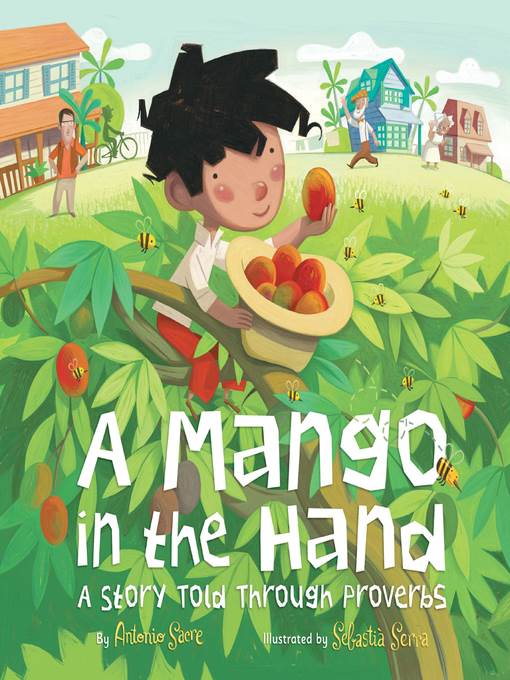
A Mango in the Hand
A Story Told Through Proverbs
فرمت کتاب
ebook
تاریخ انتشار
2015
Reading Level
0-2
ATOS
3.1
Interest Level
K-3(LG)
نویسنده
Sebastia Serraناشر
ABRAMSشابک
9781613120873
کتاب های مرتبط
- اطلاعات
- نقد و بررسی
- دیدگاه کاربران
نقد و بررسی

May 16, 2011
Francisco's attempts to fend off bees and retrieve mangos from a tree give his father many opportunities to do what fathers do best: offer words of wisdom. Papá does so in both English and Spanish ("Ãl que mucho abarca, poco aprieta. He who tries to grab too much, gets little"), and his lessons also help Francisco reach out to another familiar type of relative: the seemingly crabby (but actually lonely) aunt. Sacre's snappy storytelling avoids being overly moralistic, and Serra's digitally colored pencil-and-ink artwork creates a friendly, close-knit neighborhood for Francisco, the kind in which food, conversationâand proverbsâcan be found in abundance. Ages 4â8.

April 15, 2011
A "story told through proverbs" could easily go terribly wrong, but this sweet tale succeeds beautifully.
On Francisco's feast day, Mamá and Papá plan to make ropa vieja, tostones and aguacate. For dessert Francisco would like fresh-picked mangos from the tree a short walk from his home. Finding several bees near the tree, Francisco returns empty handed. Papá asks for an explanation. "La verdad, por dura que sea. / The truth, no matter how hard it is." Francisco admits his fear of the bees, but Papa tells him to gently shoo them away. A second attempt results in his picking more than he can handle, making for a gooey mess. Papá suggests one more time. "You can do it by yourself, mi'jo / Querer es poder. / Where there's a will, there's a way." Francisco succeeds but on the way home generously gives all his mangos to the neighbors. Through the little proverbs, Francisco learns that life is about trying, succeeding and sharing. "Amor con amor se paga. / Love is repaid with love." This smoothly written family story is filled with warmth and humor and incorporates a blending of well-placed proverbs in both Spanish and English to drive the story's themes. Digitally colored pencil-and-ink cartoon drawings reflect the lush greens of summertime and outdoor living in this intergenerational barrio.
Muy dolce. (Picture book. 5-7)
(COPYRIGHT (2011) KIRKUS REVIEWS/NIELSEN BUSINESS MEDIA, INC. ALL RIGHTS RESERVED.)

July 1, 2011
K-Gr 3-It is Francisco's saint day, and he wants mangoes for dessert. Papa declares him old enough to pick them, so the boy sets off, passing the homes of Tio Tito, Abuela, and "crabby" Tia Clara en route. But when he tries to pick the fruit, Francisco is first frightened by bees, and then, because he tries to collect too many at once, ends up smashing them. With each setback, he returns home for help, but Papa insists that his son find a way to accomplish the task. Eventually, he does, but his bounty disappears as he gives the fruit away to his relatives when he passes their houses on the way home. He even manages to engage Tia Clara, who "didn't sound so crabby after all," in conversation. Good-naturedly sitting down to a meal without mangoes, for "Sometimes, it's better to give than to receive," the family is surprised by the arrival of their relatives, who bring gifts of their own. The large, digitally colored pencil and ink stylized cartoon illustrations contain cultural elements such as a string of chilies hanging in the kitchen, labeled ethnic foods, and vegetation. Proverbs, appearing first in Spanish, then in English, are sprinkled naturally throughout the text without being intrusive, and there are many Spanish phrases, translated in a glossary, as well. Read this story aloud to spark a discussion of proverbs and to encourage problem-solving efforts.-Marianne Saccardi, formerly at Norwalk Community College, CT
Copyright 2011 School Library Journal, LLC Used with permission.

























دیدگاه کاربران